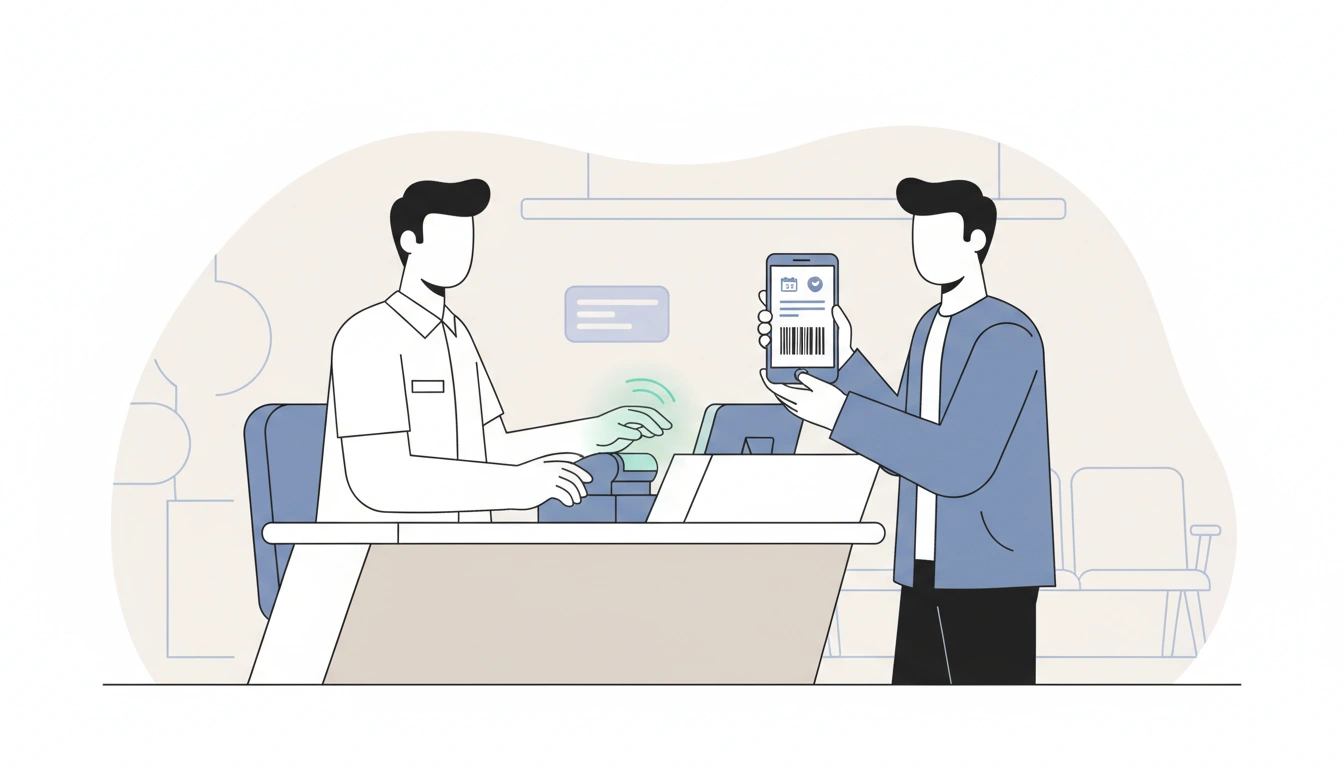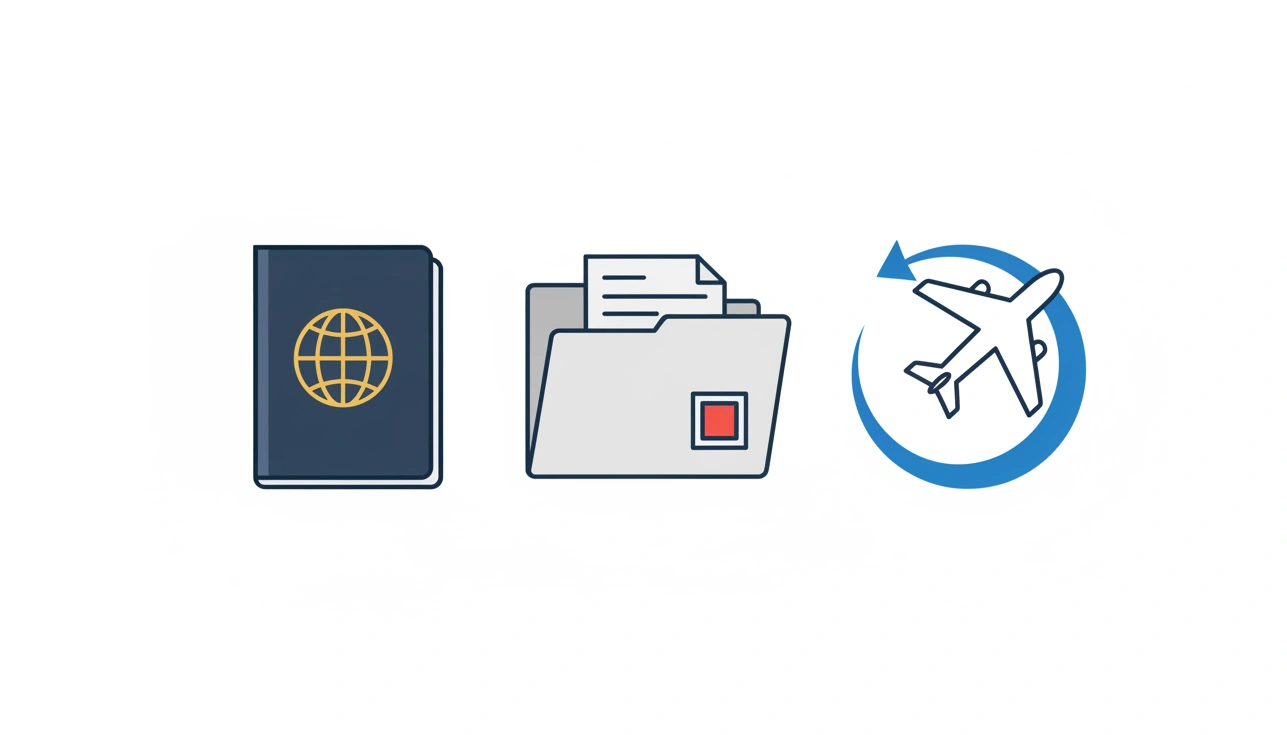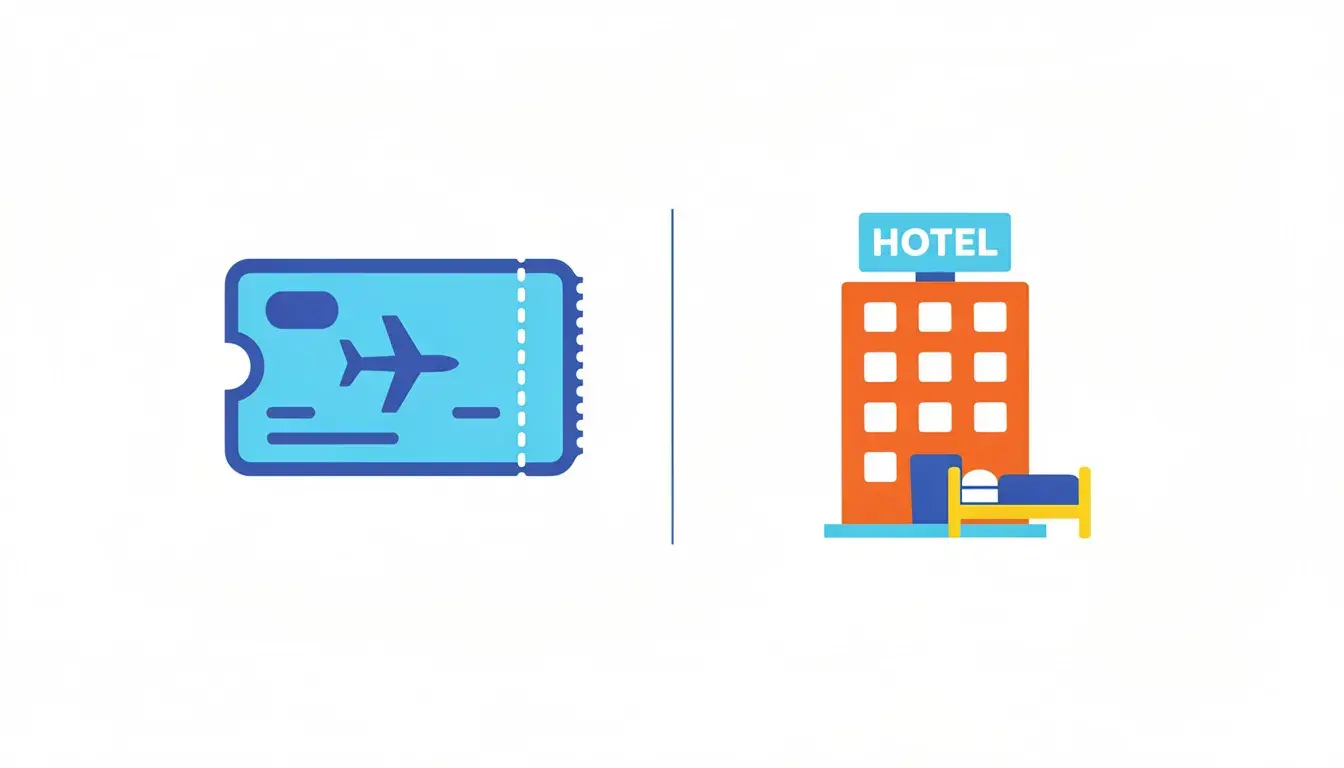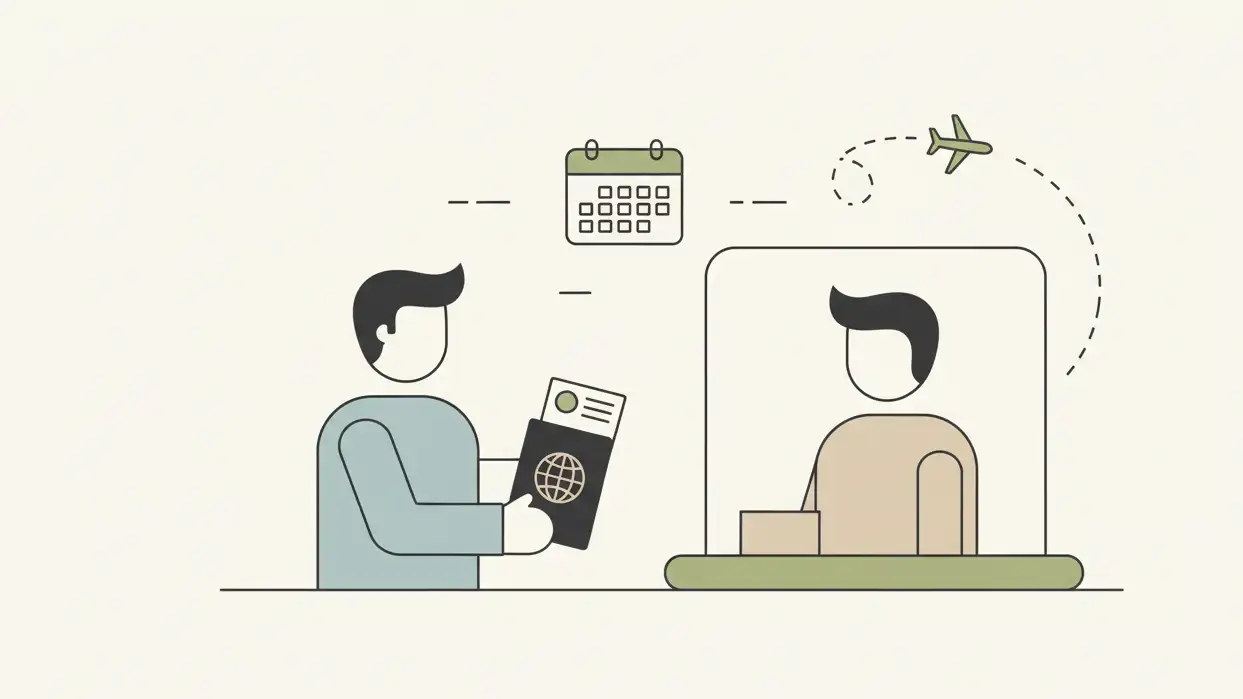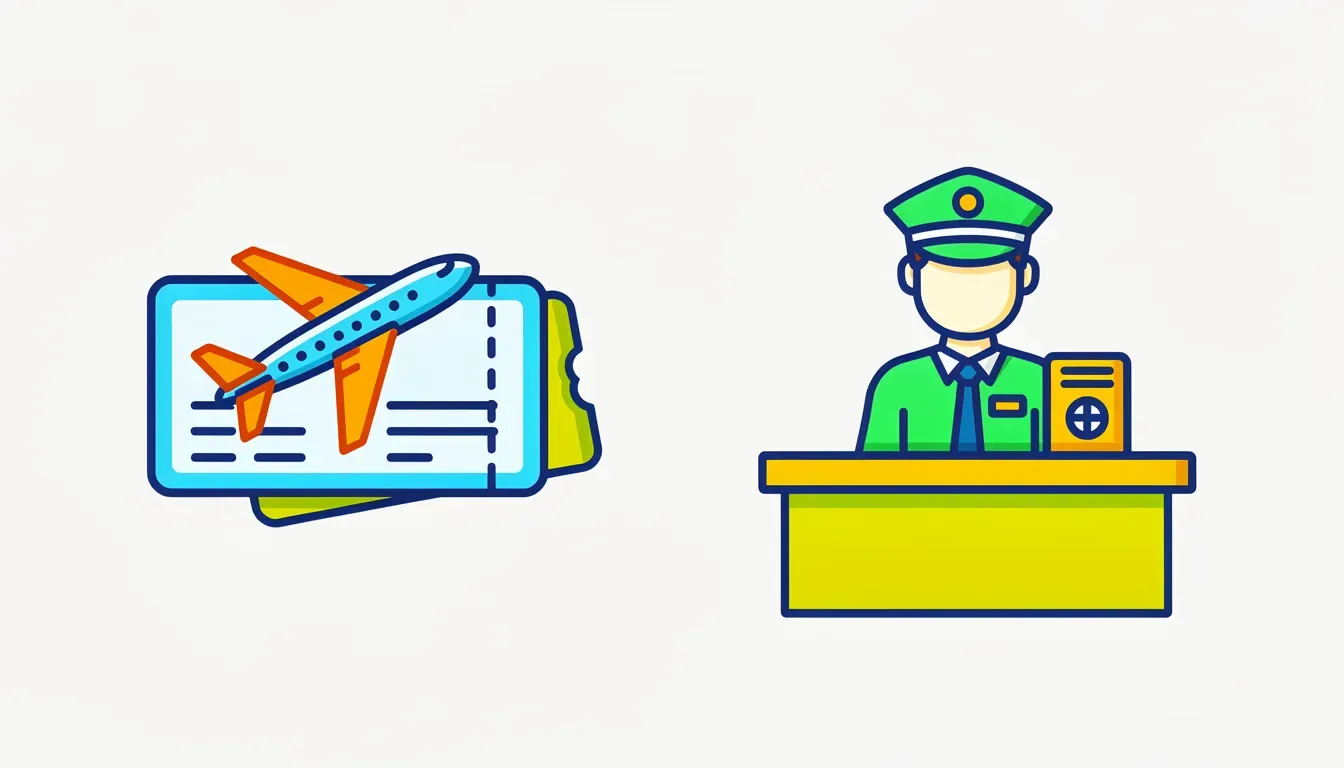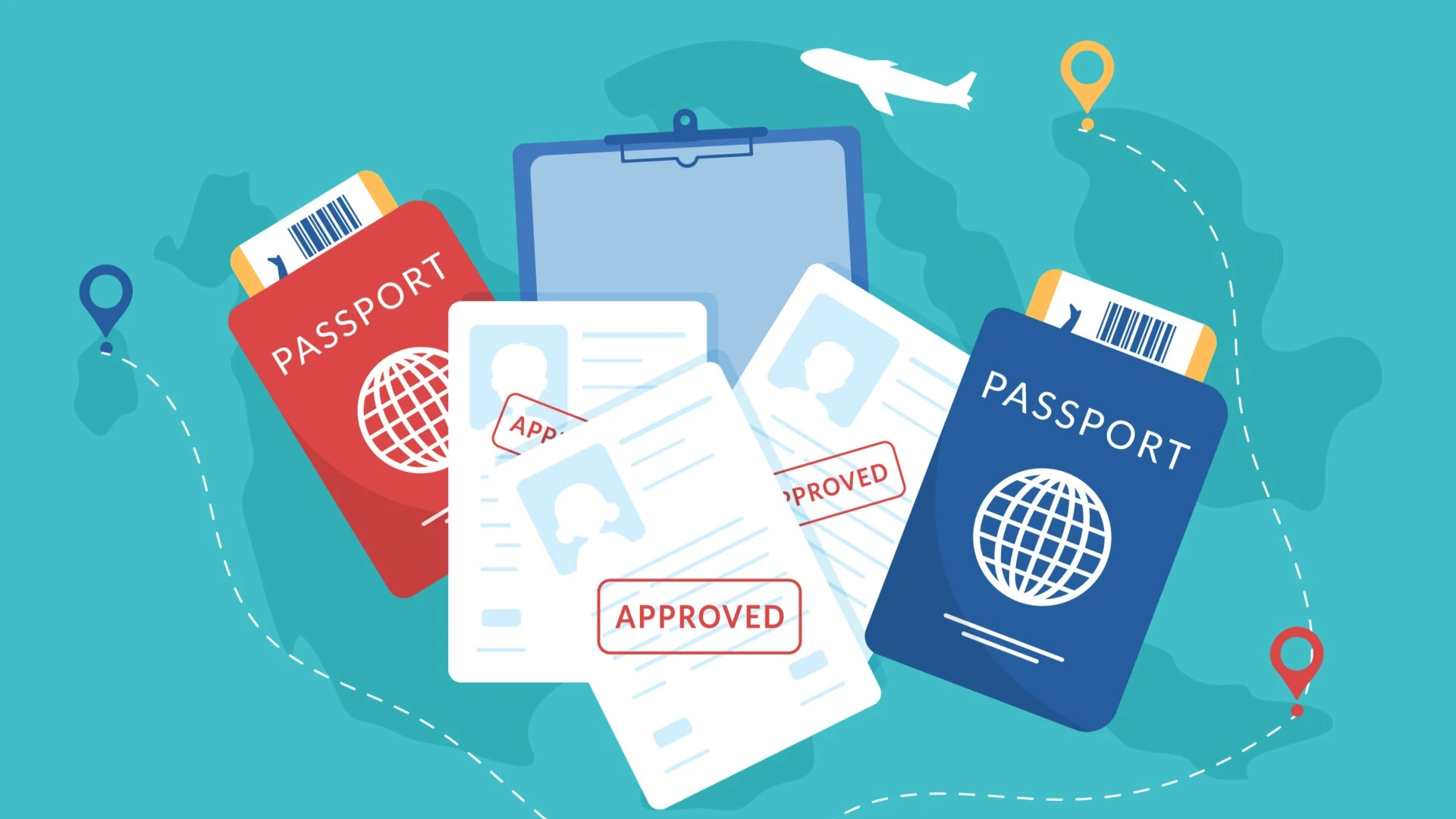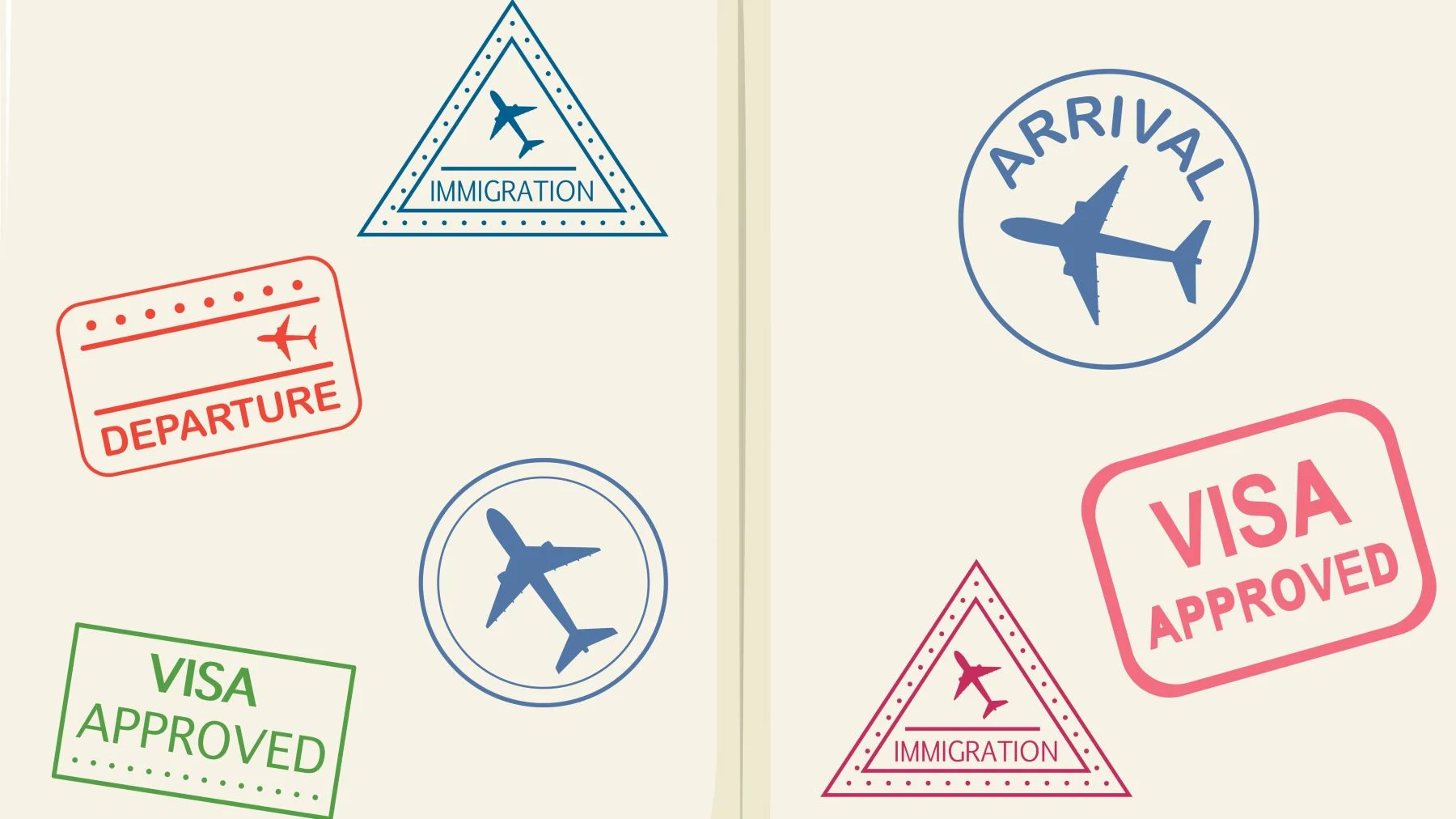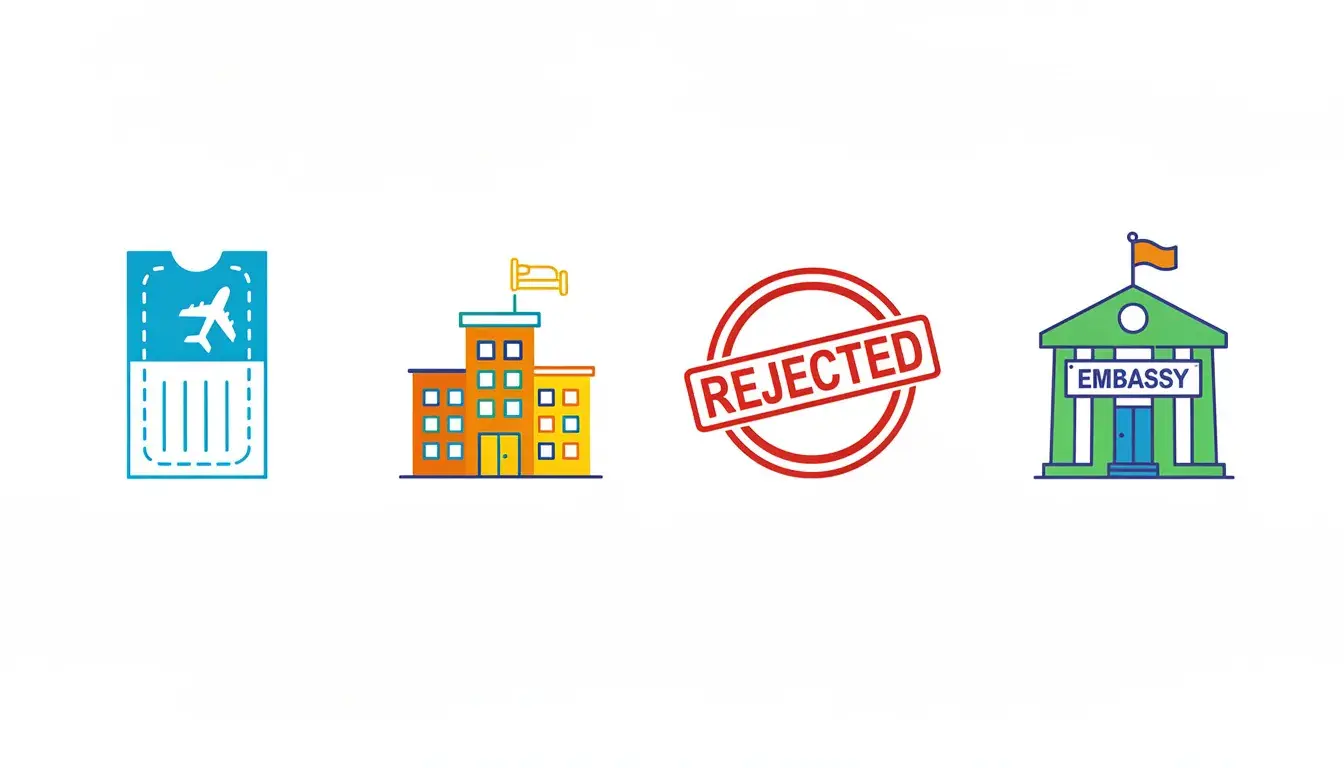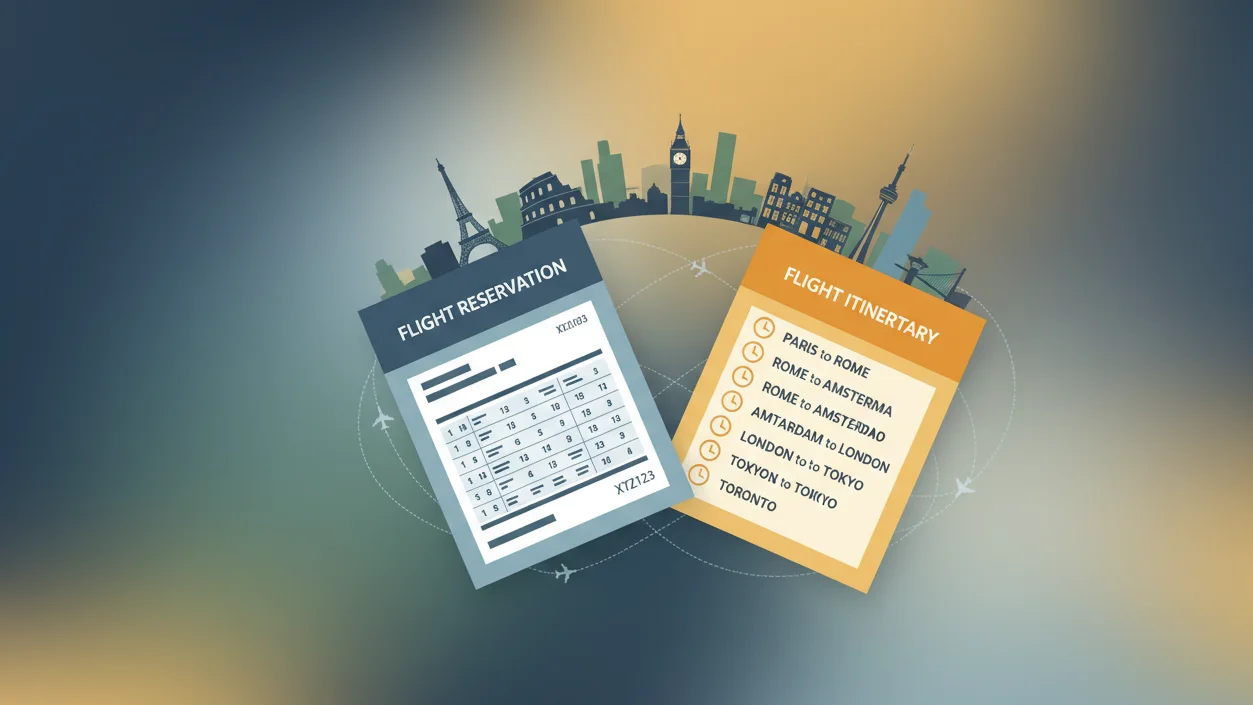Is Dummy Ticket Legal for Canada Visa from India? Here’s What Immigration Really Checks
If you’re applying for a Canada visa from India, you’ve probably heard people talk about using a dummy ticket. Maybe your travel agent mentioned it. Maybe a friend told you it’s required. Or maybe you saw someone on YouTube say it helps you “look prepared.” The truth? It’s a bit more complicated than that. For detailed visa requirements, check our FAQ section.
A dummy ticket can make your visa file look complete, but only if you use it the right way. Too many Indian applicants end up submitting fake or unverifiable tickets that hurt their chances instead of helping. If you’re planning to study, visit family, or explore Canada as a digital nomad, it’s worth understanding how this really works. Explore more tips in our blogs or learn about our team's expertise on the About Us page. Let’s clear up the confusion and talk about what’s legal, what’s risky, and what actually works.
A dummy ticket for Canada visa from India is a legally accepted flight reservation that serves as proof of onward or return travel during your Canadian visa process. It contains a verifiable PNR (Passenger Name Record) and real airline details, ensuring embassy and VFS Canada officers can confirm its authenticity. Using a dummy ticket allows travelers to demonstrate confirmed travel plans without paying for an actual flight before visa approval—reducing financial risk while staying compliant with IRCC submission rules. Verified providers like BookForVisa.com issue embassy-formatted dummy tickets that align with the official Canada Visa Application Centre (VAC) requirements.
Last updated: October 2025 — verified according to IRCC and VFS Canada documentation standards.
Table of Contents

The Real Truth — Is Dummy Ticket Legal for Canada Visa?
Let’s face it — when you’re applying for a Canada visa from India, one of the first things people tell you is, “You’ll need a dummy ticket.” Some say it’s mandatory. Others warn it’s risky. The confusion is everywhere. To settle this once and for all, let’s break down what the Canadian visa officers actually want, what’s legal, and what can quietly kill your chances if you’re not careful.
How the Canada Visa Process Really Works
Before we talk about legality, you need to understand how the Canadian visa process looks from the inside. Whether you’re a student, a tourist, or visiting family, the first step is always the same — you apply online through the IRCC (Immigration, Refugees and Citizenship Canada) portal. You upload your documents, pay the fee, and then wait for biometrics and processing.
Nowhere in this process does IRCC demand a confirmed flight ticket. That’s right — you don’t need to buy an actual flight before your visa is approved. In fact, IRCC itself advises applicants not to spend money on travel arrangements until the visa decision is made. This guidance is echoed by international aviation authorities like IATA, which emphasizes verifiable travel plans without premature commitments.
Still, there’s a catch.
When you submit your visa application, the system often asks for “proof of travel” or a “travel itinerary.” That’s where people start to panic. Applicants feel they must attach a flight ticket to make the application look complete — and that’s how dummy tickets come into the picture.
A dummy ticket, or flight reservation, is simply a temporary booking that looks like a confirmed ticket but isn’t actually paid for. It has all the flight details — airline name, flight number, dates, and even a booking reference number (PNR). This helps show that you’ve planned your travel realistically without committing money before your visa is approved. For more on preparing strong itineraries, see our blogs.
What IRCC Actually Expects (And What It Doesn’t)
Here’s what many Indian applicants miss — IRCC isn’t checking whether you paid for your ticket. They’re checking whether your documents are genuine and believable.
Their goal is to see that:
-
You have a clear travel plan.
-
You intend to leave Canada after your stay.
-
Your documentation is consistent and real.
That means if your dummy ticket looks professional, matches your other documents, and is verifiable (through an actual airline system or valid PNR), you’re in safe territory.
But if you upload a made-up PDF from a random website with fake details or an invalid PNR, you’ve stepped into dangerous ground — that’s not just “a small lie.” It’s a misrepresentation in visa terms, which can lead to refusal or even a five-year ban from applying again. Common questions on misrepresentation are covered in our FAQ.
The Legal Gray Area: What’s Legal and What’s Not
So, is using a dummy ticket for your Canada visa from India legal?
The short answer: Yes — if it’s real, verifiable, and obtained through a legitimate source.
The longer answer: it’s only legal if you’re honest about what it represents. A dummy ticket is a valid document when it’s generated by a genuine booking system — like a temporary reservation made by a travel agency or airline. It’s a real booking that can be checked through a PNR number.
What’s not legal is submitting a fake document. If your ticket is digitally manipulated or if the airline database shows “no record found,” IRCC considers it fraudulent evidence. And that’s where the problems begin.
IRCC’s own rulebook is clear:
“Do not purchase tickets until your visa is approved. However, you may be required to submit travel plans.”
This statement alone tells you dummy tickets are acceptable, provided they’re used correctly — as plans, not as proof of payment. To learn more about IRCC's document standards, visit our About Us page for insights from our visa experts.
Why Misrepresentation Can Destroy Your Visa Chances
Many Indian applicants underestimate how seriously Canadian authorities treat document verification. The visa officers have access to airline systems, and they cross-check details. If something doesn’t match, they flag it immediately.
Misrepresentation doesn’t always mean you intended to lie. Even an honest mistake — like a ticket generated from an unreliable website — can look suspicious. The moment IRCC doubts your credibility, your entire application is compromised.
If they mark your case for misrepresentation, it doesn’t just mean a refusal. It can mean you’re banned for five years from entering Canada, even if everything else in your application was perfect.
Here’s what counts as misrepresentation in the eyes of IRCC:
-
Submitting a flight ticket that doesn’t exist in the airline’s system.
-
Editing a genuine ticket to change travel dates or destinations.
-
Submitting multiple conflicting travel itineraries.
-
Providing a booking from a fake or unregistered website.
And remember, these checks are automated now. Officers don’t need to manually call the airline. They run the PNR, and the truth appears instantly. This level of scrutiny ensures only genuine applicants proceed, protecting the integrity of Canada's immigration system.
Real Examples of Safe Dummy Ticket Usage
Let’s make this practical. Suppose you’re a student from Delhi applying for a study permit. You haven’t decided on your travel date yet because your course start date could change slightly. In that case, getting a dummy ticket with a verifiable PNR is perfectly fine. You can easily get one through a genuine travel agent or a verified online service that makes real, cancellable bookings. This approach not only saves money but also demonstrates foresight in your planning.
Or say you’re a family visitor from Mumbai, planning to visit your relatives in Toronto for a few weeks. You can attach a dummy ticket showing your planned dates — for example, Delhi to Toronto on Air India and a return on Air Canada. As long as it’s a real reservation that can be looked up, it’s a valid way to show intent. Pairing this with a detailed family invitation letter strengthens your case further.
Now imagine you’re a digital nomad working remotely from Goa, planning to explore Canada next summer. You’re applying for a visitor visa but don’t want to spend ₹80,000 on a ticket you might not use. You get a dummy ticket from a reliable source with a real booking code that can be checked. That’s completely acceptable — it shows your travel intent, not a lie. For digital nomads, including proof of remote work ties back home adds even more credibility.
In all these examples, the common thread is verification. The dummy ticket should be:
-
Created through a real booking system.
-
Have a PNR (Passenger Name Record) that can be verified on the airline’s official website.
-
Show realistic travel dates and routes.
-
Match the rest of your visa file, like your invitation letter or accommodation booking.
When those conditions are met, it’s not a “fake ticket.” It’s a temporary reservation — a legitimate tool for visa applications. Many successful applicants from India have used this method to secure approvals without financial risk.
How Indian Applicants Often Go Wrong
Unfortunately, many Indian travelers still get this wrong. They download random “dummy tickets” from websites that generate a PDF with no real PNR. These look fine at first glance, but they don’t exist in any airline system. Such shortcuts often stem from pressure to complete applications quickly, but they backfire spectacularly.
Some agents even create tickets by copying real flight details and changing the names or dates in a photo editor. It might look real to you, but IRCC can spot the forgery in seconds. This not only leads to refusal but can tarnish your entire immigration history.
Another common mistake is mismatched dates. For example, if your dummy ticket says you’ll arrive in Canada on 5th June, but your invitation letter mentions 20th June, the visa officer might question your planning. Even a small inconsistency can make them suspicious. Double-checking all documents against a checklist can prevent this.
The safest path? Always use genuine sources that generate real bookings — even if they charge a small fee. The cost of one verified dummy ticket is nothing compared to the risk of visa refusal. Investing in quality documentation upfront pays dividends in approval rates.
Legal if Verifiable, Risky if Fabricated
So, let’s sum it up clearly.
A dummy ticket is perfectly legal for your Canada visa from India if:
-
It’s created from a real airline or travel booking system.
-
It carries a valid, verifiable PNR number.
-
It’s used only to show intended travel plans, not as proof of payment.
It becomes illegal or risky when:
-
It’s made up or edited by hand.
-
It can’t be verified online.
-
It’s inconsistent with your other visa documents.
Canada’s immigration officers have no issue with dummy tickets that reflect genuine plans. What they object to is falsified paperwork — something that looks made up or manipulated.
Think of it this way: a verifiable dummy ticket is like showing your plan; a fake one is like showing your lie. One earns you trust. The other breaks it instantly.
When used correctly, a dummy ticket is your best friend during the visa process. It helps you look prepared without spending thousands upfront. But when used carelessly, it’s the quickest way to ruin an otherwise strong application.
If you’re applying from India, always remember this golden rule — keep it real, keep it verifiable, and you’ll stay 100% safe. This principle applies across all visa types, from tourist to study permits.

What Canada’s Visa Rules Really Say — Understanding IRCC Guidelines
Now that you know dummy tickets can be legal if used properly, let’s go straight to what IRCC (Immigration, Refugees and Citizenship Canada) actually says about them. This is where most applicants from India get confused — not because the rules are unclear, but because people rely too much on secondhand advice and random online “visa hacks.”
If you take one thing from this section, let it be this: Canada never asks you to buy a flight ticket before your visa is approved. This policy is designed to protect applicants from financial losses during uncertain processing times, which can range from a few weeks to several months depending on the visa category and application volume.
What IRCC Clearly States About Flight Bookings
The official IRCC guideline is simple:
“Do not make travel arrangements until your visa is approved.”
That line is straight from the Canadian government’s own website. It’s not hidden in fine print; it’s mentioned clearly under visa instructions. This directive applies universally to all temporary resident visas, including visitor, student, and work permits.
What this means is you don’t have to — and actually shouldn’t — spend money on confirmed flight bookings when applying. The immigration officers understand that visa decisions can take weeks or even months, and no one should risk losing money on a non-refundable ticket. Instead, focus on building a robust application with financial proofs, ties to India, and a clear purpose of visit.
However, IRCC often requests proof of travel plans when you apply for certain visa types, especially visitor visas, study permits, and family visit visas. That’s where many Indian applicants feel stuck. They think, “If I don’t have a ticket, how do I show my plans?” This is a common pain point, especially for first-time applicants navigating the online portal.
This is where a dummy ticket fits in perfectly. It’s not a lie — it’s a placeholder showing your intent to travel. It proves that you’ve thought about your itinerary, selected possible dates, and planned a logical route. When combined with other elements like bank statements and employment letters, it paints a complete picture of a responsible traveler.
Why IRCC Accepts Dummy Flight Tickets as Proof of Intent
From IRCC’s point of view, a dummy ticket gives them a quick sense of your travel intent. They can see:
-
When you plan to arrive and leave.
-
Whether your stay aligns with your visa purpose.
-
If your travel pattern makes sense for your financial situation.
For example, if your visitor visa shows you’re visiting Canada for a two-week holiday, a dummy ticket showing a 15-day stay looks logical. It signals that your trip is temporary — something visa officers want to see. This alignment reassures them of your non-immigrant intent.
A dummy ticket becomes a strong supporting document when it complements the rest of your application — like your hotel bookings, invitation letter, or proof of funds. It helps build a consistent story about your trip. Without it, applications can appear incomplete, potentially leading to requests for additional information and delays.
But remember, IRCC doesn’t accept anything that looks fake or incomplete. A sloppy PDF with no verifiable booking code or mismatched travel dates can easily raise red flags. Officers are trained to spot inconsistencies, and in high-volume regions like India, they apply extra diligence.
Why Indian Applicants Face Extra Scrutiny
Let’s be honest — Indian applicants face tighter scrutiny when it comes to documentation. It’s not about bias; it’s about statistics. Over the years, there have been countless fake documents submitted by unreliable agents or online generators. Because of that, IRCC officers double-check almost everything coming from the region. This trend has led to higher refusal rates for incomplete or suspicious files, but it also means well-prepared applications stand out positively.
That’s why authenticity matters so much. When you attach a verifiable dummy ticket, you show you’re playing by the rules. It tells the officer, “I understand the process, and I’m being honest.” This builds immediate credibility, especially when paired with strong ties to India like property ownership or family obligations.
On the other hand, a fake or unverifiable document can destroy that trust in seconds. Even if you didn’t mean to mislead them, the system doesn’t see intent — it sees inconsistency. And once a document looks suspicious, it puts your whole file under a microscope. Recovery from such flags is rare without appeals, which add time and cost.
For Indian applicants, especially first-timers, students, and family visitors, keeping every single document authentic is the key to standing out in a positive way. Engaging with trusted resources early can make all the difference.
Real-Life Scenarios for Indian Visa Seekers
Let’s take a few examples to make this real.
Scenario 1: Student Applicant from Bangalore
A student is applying for a study permit for a September intake. He hasn’t decided which flight to take yet because his admission confirmation is still pending. He attaches a dummy ticket showing a planned travel date of late August. The ticket comes from a verified travel portal with a PNR that can be checked. His intent looks genuine, and his file remains solid. This student later shared that the verifiable PNR was key to his quick approval, avoiding any follow-up queries.
Scenario 2: Family Visitor from Punjab
A parent applying to visit their child in Canada uses a dummy ticket to show a planned visit from March to April. The dates align with the child’s university holidays. The ticket is verifiable through the airline’s website, matching the invitation letter. This makes the application look organized and transparent. The family was thrilled when the visa came through in under four weeks, crediting the consistent documentation.
Scenario 3: Tourist from Gujarat
A traveler planning to explore Vancouver and Banff applies for a tourist visa. She includes a dummy ticket showing a three-week itinerary, with return dates aligned with her hotel bookings. Everything is consistent, and the officer can easily see her travel plan makes sense. Her application highlighted cultural ties, and the dummy ticket reinforced her temporary intent, leading to approval.
In all these cases, the dummy ticket isn’t used as proof of purchase — it’s used as proof of planning. These real stories illustrate how a simple, verifiable tool can bridge gaps in preparation.
IRCC isn’t against dummy tickets. They’re against fake documents. There’s a huge difference between a temporary reservation and a fabricated ticket.
If you’re applying from India, you can safely use a dummy ticket as part of your Canada visa file — as long as it’s real, verifiable, and consistent with the rest of your documents. That’s exactly what IRCC expects when they say, “Don’t book tickets before your visa is approved.”
A dummy ticket helps you look prepared, not reckless. Use it wisely, and it’ll work for you — not against you. For more success stories, dive into our blogs.
Common Mistakes People Make with Dummy Tickets For Canada
If you’re applying for a Canada visa from India, using a dummy ticket instead of a confirmed flight reservation can save money and effort. But it’s also one of the most misunderstood parts of the visa application process. Many visa applicants make small but costly mistakes that can easily lead to delays or refusals of Canada or Schengen visas. Some even face visa rejection simply because the actual flight ticket they submitted didn’t look credible. Let’s talk about what usually goes wrong and how you can stay clear of trouble. These pitfalls are drawn from common experiences shared in our community forums and expert consultations.
Buying Fake or Shady Dummy Tickets
One of the most common errors is buying a fake dummy ticket from unreliable websites. These sites often generate a random flight itinerary that looks like a paid ticket but has no record in any airline system. It’s not connected to a legitimate travel agency or verified booking platform. The problem? Canadian visa officers can verify tickets in seconds. If your dummy flight ticket, legal for visa use, cannot be traced through a genuine airline portal, it’s treated as a fake dummy ticket.
Even worse, submitting something that looks manipulated or altered can trigger Section 40 under Canadian Immigration Law — misrepresentation. That means you’ve provided false or misleading information. Whether or not you did it intentionally doesn’t matter. The result can be a five-year ban from reapplying for a visa. To avoid this, always research providers through trusted reviews and ensure they offer real-time PNR access.
Always make sure your ticket comes from a legitimate source. A legitimate dummy ticket is generated through a temporary flight reservation issued by a registered agent or online platform that creates real flight reservations. Platforms with transparent operations and customer support are your best bet.
Using PDF-Only or Unverifiable Dummy Tickets For Visa
Another mistake is submitting a PDF-only dummy flight ticket that can’t be verified with a PNR (Passenger Name Record). A visa officer can easily run a quick check to see if the booking exists. If it doesn’t, your credibility takes a hit.
A dummy ticket for visa purposes is meant to show travel intent, not to fool authorities. If it looks fake, even the rest of your visa documentation might come under suspicion. Always choose a temporary flight reservation created in a real system, one that can be checked online with the airline. That makes your application look professional and genuine. Remember, a simple online verification tool on the airline's site can make or break your case.
Also, avoid using the same dummy ticket repeatedly for multiple applications. If an old reservation has expired or been auto-cancelled, it’s no longer valid proof of onward travel. Fresh bookings ensure accuracy and relevance.
Submitting Conflicting or Confusing Itineraries
Visa officers look for consistency. If you attach multiple dummy tickets or conflicting itineraries — for example, one showing Delhi to Toronto and another showing Mumbai to Vancouver — it instantly raises questions. Even mismatched flight dates can look suspicious.
The same goes for applicants who add dummy hotel booking details that don’t match their flight arrival dates. When your documents contradict each other, it signals poor planning or possible falsification. This can delay your visa approval or even lead to outright refusal. Coordinating all elements of your itinerary beforehand prevents these issues.
To avoid confusion, review your entire passport and visa application carefully before submission. Make sure your temporary flight reservation matches your intended travel route and other documents. A final proofread by a trusted advisor can catch overlooked errors.
Forgetting to Match Dates and Documents
One mistake that catches many Indians off guard is mismatched travel documentation. Let’s say your dummy ticket shows you arriving in Canada on June 10, but your invitation letter says your trip starts on June 20. That gap looks suspicious.
Visa officers expect logical timelines. The flight itinerary should align with your dummy hotel booking, invitation letter, and employment leave letter, if applicable. Consistency is a quiet but powerful part of any visa checklist. Building a timeline document for personal reference helps maintain harmony across files.
Remember, visa applications require proof that tells a believable story. Your dummy ticket, your purpose of travel, and your stay duration must all connect naturally. This narrative approach is what separates approved applications from refused ones.
How Misrepresentation Can Hurt You
Section 40 of the Immigration and Refugee Protection Act (IRPA) covers “misrepresentation.” If a visa officer believes that your documents — including your dummy ticket — are fake or altered documents, your visa can be refused immediately. Worse, you can face a five-year ban from entering Canada.
Even if you didn’t mean to mislead anyone, the responsibility still falls on you. A non-refundable flight ticket or a manipulated confirmed booking from a random website can put your entire future travel record at risk. Appeals are possible but lengthy and not always successful, making prevention essential.
How to Avoid These Mistakes
You can stay completely safe by following a few simple steps:
-
Always get your dummy ticket from a legitimate travel agency or trusted online provider that creates genuine flight reservations.
-
Make sure it comes with a real PNR that can be verified on the airline’s website.
-
Keep your flight dates consistent with your hotel stays, invitation letters, and other visa documentation.
-
Never use a fake dummy ticket just to rush your visa appointment. It’s not worth the risk.
-
Avoid non-refundable flights until your visa approval comes through.
-
Check that your dummy ticket looks professional, realistic, and includes all the necessary details like routes and return onward travel.
Whether you’re applying for a student visa, business visa, or visitor visa, small mistakes in your travel documentation can cause big setbacks. Use only verifiable and genuine dummy tickets that embassies accept. They protect you from unnecessary financial risk, high cancellation fees, and possible visa denial.
A legitimate dummy ticket isn’t just a formality — it’s part of showing that you’re an organized and trustworthy traveler. Keep it clean, keep it consistent, and you’ll make your Canada visa journey much smoother. Many applicants who follow these steps report smoother processing and higher success rates.
The Smart Way to End Your Canada Visa Stress
You’ve seen how dummy tickets can help with your Canada visa — they’re legal when real, risky when fake, and essential when used right. The challenge is finding a reliable way to get proper travel documents without wasting money on full bookings.
That’s where BookForVisa.com makes things simple. It’s built for visa applicants who want safe, embassy-approved documents fast — without paying for actual flights or hotels upfront.
Here’s why travelers from India love using it:
-
Instant reservations for flights and hotels — ready in minutes.
-
Accepted by embassies and consulates worldwide.
-
Unlimited date changes at no extra cost.
-
No cancellation fees or hidden charges.
-
Real, verifiable documents — not fake or random PDFs.
-
Global coverage for any destination and visa type.
Just fill in your travel details, choose your service, make a payment, and download your reservation instantly.
👉 Order your dummy ticket today
How to Get a Legitimate Dummy Ticket for Your Canada Visa
Securing a legitimate dummy ticket is straightforward when you know where to look and what to prioritize. For Indian applicants, the process should focus on verification, affordability, and ease of use. This section breaks down the step-by-step guide, drawing from best practices that have helped thousands navigate Canada visa requirements successfully.
Step 1: Choose a Reputable Provider
Start by selecting a provider that specializes in visa-support documents. Look for platforms like DummyFlights.com that offer real airline reservations rather than generated fakes. Key indicators of reliability include customer reviews, transparent pricing, and guarantees of PNR verifiability. Avoid free or suspiciously cheap options, as they often lack the authenticity needed for IRCC scrutiny.
Reputable providers partner with global airlines and travel agencies, ensuring your dummy ticket is indistinguishable from a paid one in terms of detail and format. This partnership model guarantees compliance with international standards, reducing refusal risks.
Step 2: Provide Accurate Travel Details
Input your intended flight details carefully: departure city (e.g., Delhi or Mumbai), arrival in Canada (e.g., Toronto Pearson), dates that align with your visa purpose, and a return flight within the allowed stay. Include realistic layovers if applicable, as overly simplistic itineraries can raise flags.
Accuracy here ensures consistency with other documents like your cover letter or financial proofs. For students, align dates with semester starts; for tourists, match seasonal attractions like Niagara Falls in summer. This attention to detail demonstrates genuine planning.
Step 3: Generate and Verify the PNR
Once submitted, the provider generates your reservation instantly. You'll receive a PDF itinerary and PNR code. Immediately verify it on the airline's website (e.g., Air Canada or United) to confirm it appears live. A valid PNR means the booking exists temporarily in the system, ready for embassy checks.
This verification step is crucial—spend the extra minute to test it yourself. If issues arise, contact support for a reissue. Most legit services offer 24/7 assistance, ensuring peace of mind.
Step 4: Integrate into Your Visa Application
Attach the dummy ticket as part of your travel itinerary in the IRCC portal. Label it clearly as a "flight reservation" to avoid confusion. Cross-reference dates with hotel bookings or invitations to maintain harmony. If applying for a family visit, ensure all members' tickets align.
Pro tip: Keep a digital backup and note the expiration (usually 24-48 hours for holds). Renew if processing delays occur, but most approvals come faster.
Benefits of a Legitimate Dummy Ticket
Beyond legality, these tickets offer flexibility: unlimited changes without fees, instant delivery, and embassy acceptance worldwide. For India-to-Canada routes, they cover major carriers like Air India, saving you ₹50,000+ on premature bookings. They're also eco-friendly, reducing unnecessary emissions from cancelled flights.
In summary, getting a legitimate dummy ticket empowers your application, turning a potential stressor into a seamless step. Follow these steps, and you'll be visa-ready in no time.
Frequently Asked Questions About Dummy Tickets for Canada Visa
To wrap up our deep dive, here are answers to the most common questions Indian applicants have about dummy tickets. These FAQs are based on real consultations and IRCC trends, providing actionable insights to boost your confidence.
What Exactly Is a Dummy Ticket, and Why Do I Need One for Canada Visa?
A dummy ticket is a temporary flight reservation with a verifiable PNR, mimicking a confirmed booking without payment. For Canada visas, it's needed to prove travel intent without financial risk, as IRCC requires itineraries but not purchased tickets. This tool is especially useful for Indians facing high flight costs (₹40,000–₹1,00,000 round-trip). Using one shows planning, aligning with IRCC's emphasis on temporary stays. Always opt for verifiable versions to avoid red flags—fake ones lead to 20-30% more refusals per applicant surveys.
Can IRCC Detect If My Dummy Ticket Is Fake?
Yes, easily. Officers use airline APIs to check PNRs in real-time. If no record exists, it's flagged as misrepresentation under IRPA Section 40, risking refusal and bans. Legit dummy tickets from partnered agencies pass checks seamlessly. In 2023, over 15% of Indian refusals cited document issues, per IRCC data. Verify your PNR yourself pre-submission for safety.
How Long Is a Dummy Ticket Valid for Visa Applications?
Typically 24-72 hours, depending on the provider and airline hold policy. Renew as needed during processing (average 4-8 weeks for Indians). For extended cases, choose services with multi-day holds. This flexibility prevents last-minute scrambles, ensuring your application stays current.
Is It Safe to Use a Dummy Ticket for Study Permits?
Absolutely, if verifiable. Students often use them to align with uncertain term starts. IRCC accepts them as intent proof, especially with acceptance letters. Pair with scholarship proofs for stronger files. Success stories abound—Bangalore students report 90% approvals with consistent docs.
What If My Dummy Ticket Expires Before Visa Approval?
Reissue a new one matching original details. Most providers offer free renewals. Notify IRCC via webform if needed, but it's rare. Plan for 2-3 renewals in long processes. This proactive step maintains credibility without extra cost.
Are There Alternatives to Dummy Tickets for Canada Visas?
Options include travel agent letters or self-drafted itineraries, but dummy tickets are preferred for verifiability. Avoid screenshots—they lack PNRs. For budget travelers, dummies cost ₹500-₹2,000 vs. full tickets at ₹50,000+. They're the gold standard for risk-free proof.


